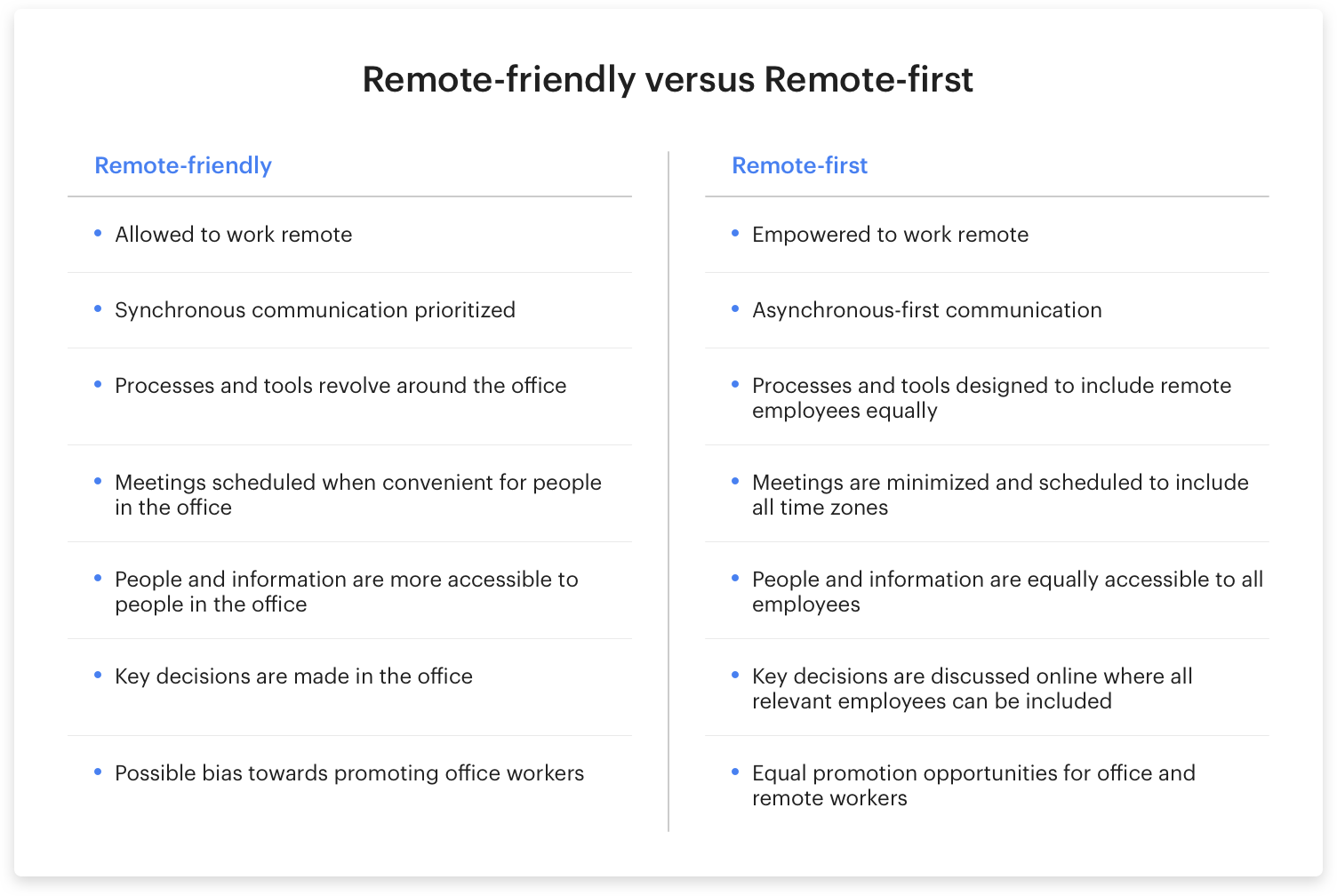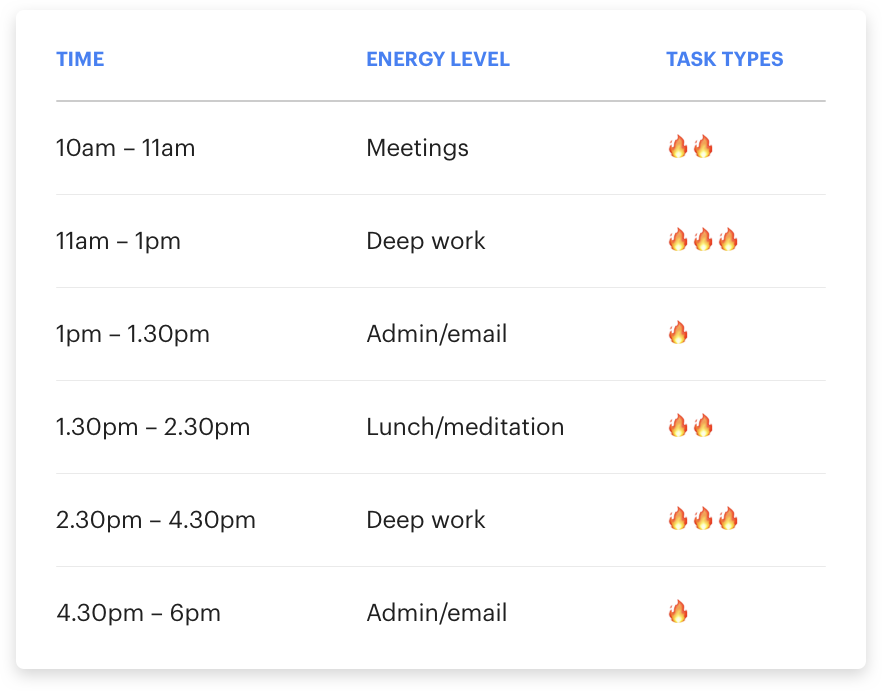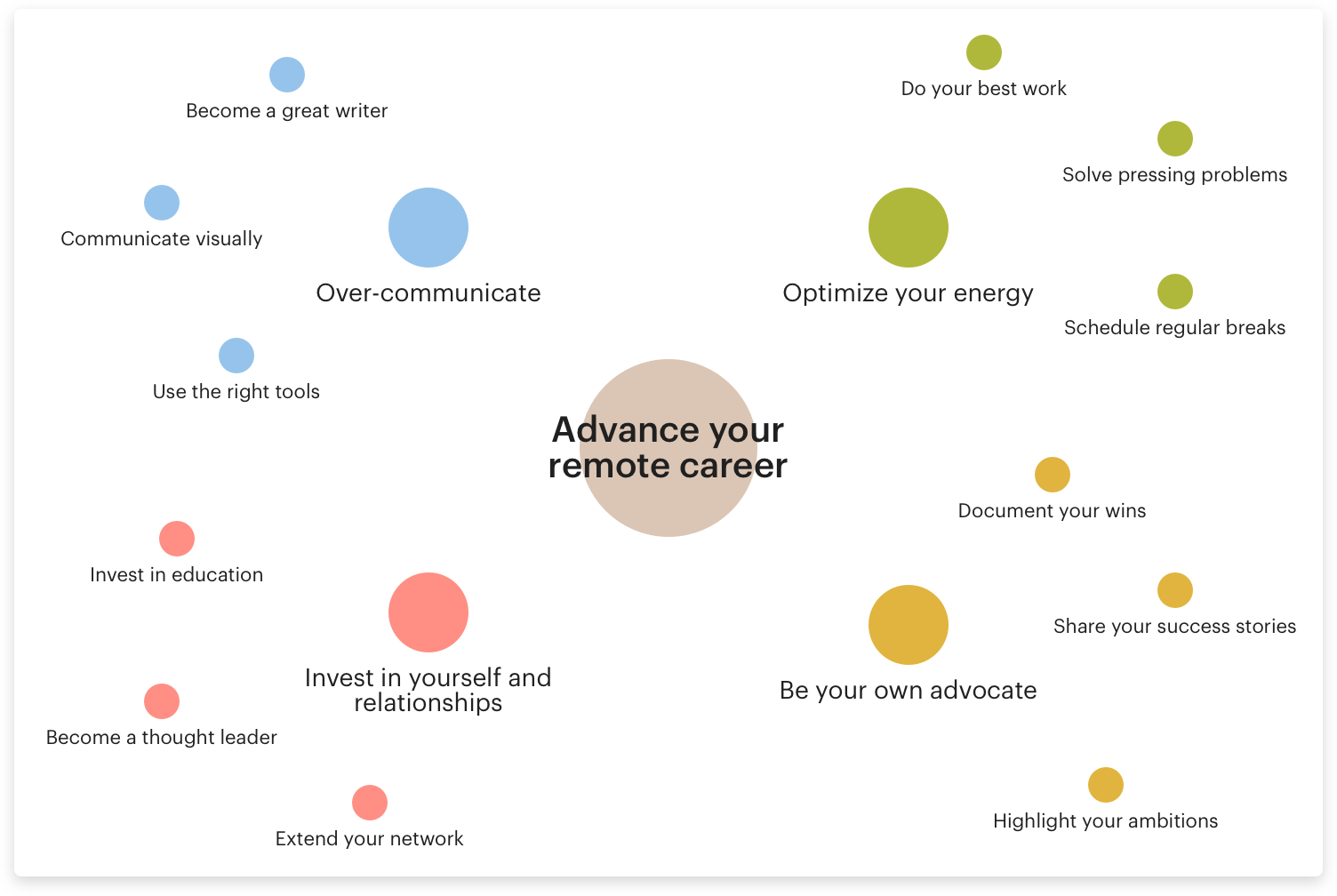There’s a common misconception that working remotely puts you at a big disadvantage when it comes to career advancement.
Traditional value signaling doesn’t work in a remote setting. There’s no “face time” with the C-suite, no after work happy hours to build team connections, no extra points for showing up early and staying late.
But what the naysayers overlook are the unique benefits working remotely presents for advancing your career. When you’re in charge of your own schedule, you tend to have more time and energy to invest into learning new skills, building your personal brand, or moving up the career ladder within your current company. And for parents with small children or people living outside of big urban centers, remote work may be one of the only ways to build the career they want.
We talked with six talented people who have moved into leadership positions, become people managers, and increased their seniority as individual contributors—all while working remotely.

Here’s what they have to say on the benefits and challenges of career advancement in a remote setting, along with their advice on how to leverage both to succeed.
Success starts with working for a remote-first company
Whether you work for a fully remote company or a partially remote company, success starts with working for a remote-first company.
Emilie L Schario, a Data Engineer at Gitlab, is married to an army officer, so she has to be ready to pick up and move to follow his posting often with little advance notice. Remote work gives her the stable employment she needs to grow her career, even if her address changes multiple times a year. However, she’s found that not all remote situations are equal when it comes to building a meaningful career.
“In previous roles, I was the only person who worked remotely. In those cases, I felt very forgotten by my employer.”
In previous companies when she was the only person working remotely she often felt excluded and overlooked. In contrast at Gitlab, a fully remote company, Emilie was promoted to her current role after just a year:
“Getting promoted while working remotely really depends on how remote your company is. GitLab is a fully remote organization with over 700 folks around the world, so getting promoted wasn’t difficult at all. In previous roles, I was the only person who worked remotely. In those cases, I felt very forgotten by my employer.”
She’s not alone in her previous feelings of isolation. A recent study published in the Harvard Business Review revealed that it’s easy for remote workers to feel left out if they don’t work for a company that has taken measures to build trust and connection between their on-site and remote employees.
What’s the difference between a remote-first company and a remote-friendly company? A lot of things that will directly impact your ability to succeed in your current role and your overall career:
A remote-friendly company allows remote work
At a remote-friendly company, the leadership and most of the team are likely to work from your company’s headquarters or from one of its offices. Your company may allow you to work remotely (hence the “friendly” element). But, most of your company’s processes, tools, and meetings will revolve around the office. As a result, remote teammates often feel excluded from important meetings and company decisions, even if that’s not the intention. There may even be a natural bias towards promoting people who work in the headquarters, who’ve had the opportunity to bond in-person with teammates and leadership.
A remote-first company empowers remote teammates (it’s in its DNA)
In contrast, a remote-first company doesn’t just allow employees to work remotely—it will empower them to. Remote-first companies make asynchronous communication the default, where employees can check and respond to messages at a time that best suits them in their particular time zone. Meetings, tools, and processes guarantee remote teammates equal opportunities to contribute ideas and access information. In fact, the company may not have an office at all. When it comes to promotions, remote and co-located teammates are all on an equal footing.

Help create a remote-first culture
The easiest way to build your career remotely is to apply at a remote-first company in the first place.
However, if you’re working remotely for a company that’s not remote-first and aren’t prepared to leave, take the lead on steering your team from remote-friendly to remote-first. Making meaningful improvements to your company’s remote policies, tools, and attitudes will require taking on a leadership role, which can in itself help advance your career.
Here are the first few steps you can take to start moving your company from remote-friendly to remote-first:
- Create a business case to get buy-in from management that clearly conveys the business value of moving to a remote-first culture. Highlight examples of how similar businesses to yours have succeeded by adopting remote-first best practices. Advantages include more productive employees, better documentation of information, and higher employee retention.
- Introduce the right tools. For example, make sure you have tools that facilitate transparent and asynchronous collaboration, like Twist, and reliable video conferencing software for real-time meetings, like Zoom.
- Define which communication and collaboration methods people should use and when. For example, for urgent matters people should have phone numbers of who to text or call (or message on a tool like Telegram if they’re in another country). On the other hand, for important project decisions that require a back-and-forth dialogue between stakeholders, threaded conversations will work best.
- Introduce remote-first meeting procedures. For example, you could create guidelines where all employees take meetings over video call to level the playing field and give everyone an equal opportunity to contribute.
- For important conversations that happen in the office, suggest a policy of moving all key discussions online for input from remote members of the team.
- Help review your company’s job descriptions and career advancement plans to make them more remote-friendly. For example, highlight how important written communication and collaboration skills are to develop in order to thrive in your company.
Once you’re working for a remote-first company, you’ll see that there are lots of benefits you can leverage to advance your career.
Capitalize on the advantages of working remotely
From the people we chatted with who had grown their careers while working remotely, there was one overarching consensus—the benefits far outweigh the challenges. Here are just a few of the benefits remote work provides and how you can make the most of them to build a meaningful career:
More time, flexibility, and energy to go above and beyond
When you’re working remotely you don’t have a long commute, workplace politics, or typical office distractions tying up your precious energy reserves and taking large, unproductive chunks out of your day.
Not everyone works best between the hard lines of nine to five:
- Some people are morning larks, some are night owls, and others do their best work somewhere in the middle
- Many people combat the afternoon slump by splitting up the day with a long lunch or going to the gym
- And of course, lots of people have other responsibilities they need to schedule their work day around, like dropping their children off at school or looking after a sick relative
“I’m more productive than I’ve ever been, working the fewest hours I have ever worked.”
Luckily, as a remote worker you’re largely in control of your own schedule. You can take advantage of this flexibility by working around your other time commitments and focusing on doing your best work when your energy is highest. Then, you can use the extra energy you have to invest back into your career growth. Here are just a few ways you can do this:
Optimize your energy peaks to do your best work
Gonçalo Silva, who was promoted from Android Engineer to CTO of Doist, credits his career advancement to being able to optimize his schedule to do his best work:
“I’ve never been a good fit for a nine to five office. I’m an extreme night owl and my productivity fluctuates considerably throughout the day. I lead a somewhat chaotic lifestyle that works for me and those close to me, but falls flat in the eyes of society’s time-bound expectations.”
In contrast, remote work has given him the freedom to work when he’s most productive—often at night and sometimes even on weekends.
“I’m more productive than I’ve ever been, working the fewest hours I have ever worked. The opportunity to truly optimize for my own energy and attention is something that is directly enabled by working remotely.”
Plan to do your best work at peak energy times
- Map out the time slots you have available to work each day. Make sure to cross out or remove any time slots you need to look after other important commitments, so you’re not stretching yourself too thin.
- Track your energy levels every half hour during your allotted time slots over a one or two week period. Then use a point system to assign specific time slots when your energy is at its highest, average, and lowest. Using emojis like 🔥 can make this a bit more fun and easier to stick with.
- Next, group your daily tasks into task types, like ‘deep work’, ‘admin/email’ and so on. Give each task type on your to-do list an energy rating based on the energy (not time) it usually requires. This should be personal to you. For example, for introverts, meetings tend to take up more energy reserves than for more extroverted folks. Equally, some people are natural writers and can fly through a blog post, while others need more energy to battle through to the finish line.
- Then, schedule each day so that you’re doing your most important work at your peak energy times—this will most likely be deep, value-creating work like problem-solving, coding, strategic planning, or content creation. Author of bestselling book, Deep Work: Rules for Focused Success in a Distracted World, Cal Newport suggests the upper limit for deep work is four hours per day. Beyond four hours, your ability to direct focused attention will diminish. So, for peak performance don’t plan for more than four hours of deep work per day.
- Optimizing your energy isn’t just about crossing items off your to-do list. Working on your mindset is a key part of keeping your creativity and energy levels high. So, set time aside to work on your mental well-being too—for example, you could meditate, take a quick walk or even just a few deep breaths. Again, focus on what works best for you and the time you have available.

Get more ideas for crafting your remote work day to maximize your productivity.
Use the extra time and energy to invest in yourself—your education and personal brand
Lucia Fontaina-Powell, who was promoted from Quuu’s Content Manager to the company’s Marketing Director, uses the extra time and energy she has from working remotely to invest back into developing herself and her career.
“Because I have more energy and freedom, I stay curious and am always looking for opportunities to educate myself. I have more time outside of work, which means that I can get involved in freelance or personal projects—and I find that everything I learn feeds back into my work at Quuu.”
By investing in yourself, your education, and your personal brand, you’ll become indispensable to your company and make a name for yourself in your industry.
Here are some concrete steps you can take:
- Identify a key area you’d like to improve or develop. Then, sign up for an online course. If you’re not sure where to start, here’s a list of top 60 free online courses that covers everything from marketing and business to finance and coding.
- Attend industry conferences to keep up to date with the latest trends and best practices in your industry.
- Work on a side project that will help improve your skills and/or build your personal brand. For example, you could start a blog, create an app, or host a relevant event in your area.
- Reach out to experts in your field with specific questions about challenges you’re facing that they’ve dealt with in the past.
- Cultivate a high-quality RSS feed of industry publications or blogs to keep up to date on new developments and ideas.
- Go to meetups in your area. Or, if a meetup doesn’t already exist, organize one yourself and invite people in your field who may be interested. This is a great way to build relationships and connections.
Flip remote challenges on their head and use them to your advantage

Of course, there are very real hurdles to overcome when advancing your career in a remote setting. Most of these challenges stem from the physical barriers of remote work—for example, lack of visibility, lack of face time to foster in-person relationships, lack of “watercooler serendipity” moments where you can share your wins with your boss, etc. But, with the right strategies you can flip these challenges on their head and use them to your advantage:
Combat lack of visibility by becoming your own advocate
When you’re working remotely, your success stories won’t naturally come up as you chat with your boss or CEO by the coffee machine. You won’t get credit for coming to work early or staying late (which is, in fact, a great thing). Lack of visibility is one of the main challenges you’ll face when developing your career in a remote setting, so you’ll need to work a little harder to make sure your achievements are “seen”.
“The best way to take the next step in your career is to ask your manager!”
Taru Bhargava is currently a Content Marketing and SEO specialist at Foundation Marketing. Before that she worked at an agency where she was promoted to Inbound Marketing Manager while working remotely. When talking about the challenges of getting promoted in a remote setting, she says, “Since there’s no day-to-day interaction it can get difficult for management to clearly see what you’re up to and what changes and results you’re bringing in. This can get in the way of promotions.” Taru’s advice:
“Document every win. This can come in handy when discussing the next steps. Book as much face time with your line manager as you can. Also, take initiative and take on tasks that show your capabilities.”
Leah Knobler who was promoted from a People Ops Generalist to Talent and Culture Lead at Help Scout also recommends advocating for yourself by making your ambitions clear:
“The best way to take the next step in your career is to ask your manager! You don’t always know what’s possible until you’re direct with your own goals and desires. You might not even realize that the company has a need and that you want to help solve that need, so speak up and advocate for yourself.”
Become your own advocate:
- Get clear on the next step/steps you’d like to take in your career. What’s your job title? Do you want to be a people manager or an individual contributor, for example? What skills would you like to master?
- Ask for a one-to-one with your boss and communicate the next steps you want to take in your career. Then, ask for feedback on how you’re tracking towards your goals and seek advice on how to fill in your skill and/or knowledge gaps.
- Build a custom scorecard to track the areas you’d like to improve and report on your progress monthly.
- Add success stories to your scorecard that show how your work impacts the business’ bottom line. For example, if you create ebooks as part of your role, how many qualified leads did you generate last month and how many of those went on to become paying customers?
- Build a consistent narrative. If you’re changing up the scorecard each week, you’re not creating an easy narrative to follow. Consistency is key. Each week should build on the next.
- Consider who else needs to hear about your success stories. For example, if you’ve built a valuable new feature for your product, you can send an email to your marketing and sales teams communicating the benefits of the new feature and the results and feedback you’ve seen so far. Make it clear what’s in it for each recipient—for example, will this help the sales team sell more of your product?
- Don’t forget to sincerely thank other people who have helped contribute to your success—whether that’s the success they’ve helped you achieve on a particular project or how they’ve helped you grow as a professional.
Jeremey DuVall, a remote Happiness Engineer at Automattic, put together a detailed guide on how to communicate your value at work, especially when that work may not be immediately visible to your bosses.
Tackle lack of “face time” with over-communication
Not so soft skills, like communication and collaboration, are becoming increasingly important in the workplace, especially as more jobs and processes are automated. Clear communication is essential for getting buy-in from stakeholders on your ideas and for effectively collaborating on projects. But of course, lack of face time with colleagues can make communicating a little bit more difficult in a remote setting.
“Become a great writer. Writing is of the utmost importance when working remotely.”
Helpscout’s Talent and Culture Lead, Leah Knobler says one of the best ways you can advance your career is by putting the time and effort into thoughtfully communicating with your team.
“The key to being successful as a remote employee is to be an excellent communicator, both verbally and in writing, so sharpen those skills. Remote work requires a high level of trust and transparency, which you get by communicating what you’re working on—whether it’s through video walk-throughs, shared docs, weekly stand-ups, etc.”
Writing is a particularly important skill to master in any remote setting. When communicating with your team always strive for brevity and clarity of thought. Gonçalo Silva, CTO at Doist, says that one of the most important steps to succeeding as a remote worker is to “become a great writer”:
“Writing is of the utmost importance when working remotely. Remote workers rely on writing for the vast majority of day-to-day communication. There is no body language, or a water cooler to lean on and clarify things. It’s critical to write in a way that is clear, succinct, and to the point.”
Master asynchronous communication:
- Create a weekly update to share with your team and/or boss that shows the status of your most important projects.
- When writing emails, team updates, and project briefs keep your content short, yet comprehensive enough to provide people with all of the details they need—including answers to follow-up questions.
- Avoid ambiguity at all costs. Work hard to make your communication crystal clear so there’s no room for confusion, which at best could cause a delay in your project and, at worst, could fracture relationships between you and your teammates.
- Anticipate the questions your boss, teammates and/or project stakeholders will have and proactively answer and document these ahead of time.
- When you want to explain an idea visually—like your thought process behind a new design—this is the perfect opportunity to document a video walk-through with video capture tools like Screenflow or Snagit.
Fight isolation by building meaningful relationships inside and outside your company
Of course, communication isn’t just about effectively managing projects and ticking items off your to-do list. It’s also about building genuine relationships. Studies show that office friendships help increase productivity and satisfaction and reduce stress and isolation. Plus, building and nurturing genuine relationships—both inside and outside your company—can help you improve and advance your career.
“Not working in an office with lots of colleagues has meant I’ve invested more in online relationships.”
When Head of Marketing at DataTrue, Kasey Bayne worked remotely at Olark she was promoted to Director of Marketing. She prioritized getting to know her team on a personal level. She recommends being really intentional about building relationships with the teammates and stakeholders you work with most.
“Every other month I scheduled virtual tea time with people I worked with, even when I had lots of work to do. These relationships not only make your day to day more enjoyable, but it also helps build trust, which makes working together on projects more efficient.”
Get personal with colleagues
- Schedule virtual lunch dates with your teammates that have nothing to do with work and just get to know each other on a personal level.
- When you have a meeting scheduled, don’t jump straight into your meeting agenda. Start each meeting by asking the person how they are and find a personal connection point. For example, maybe you both have pets or hobbies you can chat about for a few minutes before diving into the details of your project.
- Sometimes the camera can pose a barrier that prevents people from opening up like they would in-person. So, look out for verbal and non verbal signals for how people are feeling. If you sense something’s off, don’t be afraid to ask if they’re okay just like you would in the office.
- Use one-to-ones as a safe space to discuss your feelings with your boss and let them get to know you a little better as a person. For example, let them in on your goals, fears, and challenges.
Quuu’s Marketing Director, Lucia has also seen great success from building genuine relationships with experts in her industry, particularly online.
“Not working in an office with lots of colleagues has meant I’ve invested more in online relationships. I’m part of some fantastic communities on Slack and Twitter, where I’ve met real industry pros who have supported me and taught me a lot.”
Extend your network and build your tribe
- Join relevant online communities on Slack, Facebook, and LinkedIn and start contributing to conversations.
- Provide value and help people out with small favors, like contributing a quote for an article they’re writing, for example. Or, if someone has a question about a challenge you’ve dealt with, share your advice.
- If you’re struggling with an area of your own career development don’t be afraid to reach out to your online community and ask for help.
- Use Twitter as your virtual watercooler where you can share your thoughts on your industry and subject matter expertise. Pose thoughtful questions and contribute to conversations that are happening in your industry.
- If you read a blog post that helped you master a specific area of your career, listened to a podcast that truly resonated with you, or watched a video that inspired you, reach out to the content creator and let them know. You can mention them on Twitter or send them an email. That person will appreciate you taking the time to send genuine praise their way, and you never know—it might be the start of a genuine professional relationship.
- Schedule virtual (or in-person) coffee dates with people you respect and admire in your industry.
- Attend industry events and go out of your way to proactively meet people in your industry in-person.
Use the lag in time zones to solve pressing problems
Time zone differences are undoubtedly one of the biggest barriers you’ll face as a remote worker. If left unmanaged, they can get in the way of syncing with your team in real-time and building meaningful relationships. The barrier can become even more prominent when you’re a people manager or working in a cross-functional role.
But you can use these time gaps to your advantage too. For example, when Kasey Bayne, Head of Marketing at DataTrue worked at Olark she was promoted from Marketing Communications to Director of Marketing. One of the biggest challenges she faced while managing a remote team was working in a different time zone than the rest of her team. But instead of getting frustrated, she got creative and took the initiative to solve pressing problems when she was the only one awake.
“If you’re self-sufficient and a problem solver working in a different time zone can give you the incentive to do a lot of things outside of your typical day to day. For example, if you’re the only one awake in your time zone and a particular problem arises, you can figure out how to solve it.”
Become a problem solver:
- If you spot a problem while your teammates are sleeping don’t be afraid to jump in and solve it. This will show initiative, and over time you’ll build a reputation as a problem solver.
- When you solve an important problem make sure to let people know via a communication app like Twist, or during your next one-on-one with your boss.
- Document the problem you’ve solved so your teammates and relevant stakeholders have full visibility. Give a clear description of the problem, how you solved it, and what the results were.
- Keep a running document with all of the problems that you’ve solved over the past quarter or six month cycle. Then, when your next review comes around you’ll have plenty of examples and accompanying stories to showcase your problem solving skills.
- Great problem solvers are proactive, not just reactive. So, if you spot a problems that consistently reoccurs, you can come up with a solution to prevent the problem from happening in the future. For example, is there a process you can automate, through an automation tool like Zapier?
Future proof your career
In today’s rapidly changing world, remote work is becoming more and more prevalent. Learning how to be successful remotely now will only benefit you more in the future. Emilie Schario, a Data Engineer at Gitlab, put it this way:
“Remote work is the future, so we need to understand what career progression in this remote-work framework looks like. Out of sight, out of mind, can be a problem! But, results really do speak for themselves.”
Far from being a barrier, remote work can empower you to advance your career. You’ll have the time, energy and flexibility you need to your best deep work, invest in your career growth and build meaningful professional relationships.
The only downside: you may find it impossible to ever go back to an office again.

